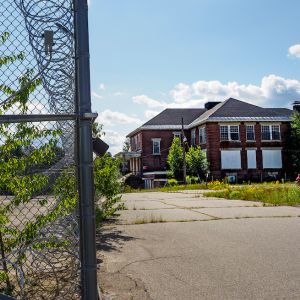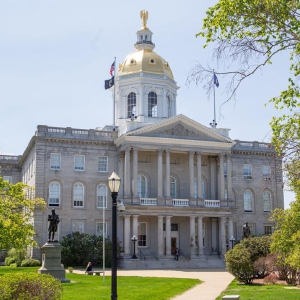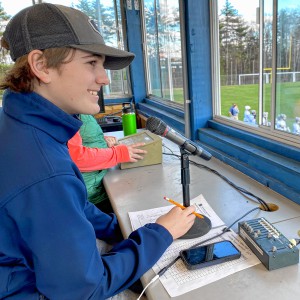Health leaders push for vaccines as student vaccination rates drop
| Published: 01-25-2023 5:46 PM |
The number of Granite State students up to date on the several vaccines the state mandates for school attendance is going in the wrong direction, health experts say. The trend is playing out nationally too, the Centers for Disease Control and Prevention reported earlier this month.
Experts say even a small decline in vaccination rates, which New Hampshire has seen, increases the chance of communicable diseases spreading through a school and beyond. For measles specifically, the CDC said the 93.5 percent vaccination rate among the country’s kindergarteners still puts 250,000 of their peers at risk of becoming infected.
Vaccine skepticism, which hampered uptake of the COVID-19 vaccine, plays a role, but it’s hardly the driver, health experts said. Nor are religious exemptions, which so dominated legislative debates last session that lawmakers made it easier for parents to get one.
Religious exemptions for all students have dropped since the 2019-2020 school year, when 2.5 percent of parents requested one, to 1 percent this year, according to the Department of Health and Human Services. (The COVID-19 vaccine fueled the change to exemption requests but is not required to attend school and child care facilities.)
Dr. Erik Shessler, chair of general pediatrics and associate medical director for Dartmouth Health Children’s and vice president of the New Hampshire Chapter of the American Academy of Pediatrics, says two other culprits are responsible for the dip in vaccination rates: Staff shortages and the pandemic made it harder for children to get their annual physicals, where providers update vaccines and check a child’s overall mental and physical health. And, some families aren’t prioritizing rescheduling those missed visits.
“One of the things that we’ve had to do around the state and around the nation is a little bit of that cheerleading again, being like, ‘No, no getting your regular physical is a big deal,’ ” Shessler said. “Like any kind of pandemic or any catastrophe, people were expecting the sky to have fallen, and when the sky didn’t fall, it was, ‘Well, I’ll get back to it, but just not right away. I’ll get there when I get there.’ ”
Shessler and other public health experts are urging parents to reschedule missed appointments as soon as possible. But they warn that won’t reverse slipping vaccination rates immediately because providers are dealing with an uptick in flu and RSV cases while trying to reschedule adults and children who delayed care during the pandemic.
“We’re behind and so you add their delay plus our delay, and you end up kind of getting behind with vaccines,” Shessler said.
Article continues after...
Yesterday's Most Read Articles
 “It’s beautiful” – Eight people experiencing homelessness to move into Pleasant Street apartments
“It’s beautiful” – Eight people experiencing homelessness to move into Pleasant Street apartments
 No deal. Laconia buyer misses deadline, state is out $21.5 million.
No deal. Laconia buyer misses deadline, state is out $21.5 million.
 N.H. Educators voice overwhelming concerns over State Board of Education’s proposals on minimum standards for public schools
N.H. Educators voice overwhelming concerns over State Board of Education’s proposals on minimum standards for public schools
 Matt Fisk will serve as next principal of Bow High School
Matt Fisk will serve as next principal of Bow High School
 High schools: Coe-Brown softball wins 5th straight, Concord’s McDonald pitches first varsity win, Tide’s Doherty scores 100th career point
High schools: Coe-Brown softball wins 5th straight, Concord’s McDonald pitches first varsity win, Tide’s Doherty scores 100th career point
 Construction of housing project in former Church to begin with parking dispute in the rearview
Construction of housing project in former Church to begin with parking dispute in the rearview
State law requires children to have several vaccines to attend private or public school or child care facilities: diphtheria, mumps, pertussis, poliomyelitis, rubella, rubeola, and tetanus. The Department of Health and Human Services, which can also mandate vaccines, requires Hepatitis B and chickenpox vaccines, and a vaccine that protects against meningitis, epiglottitis, and pneumonia.
The department would lose its authority to mandate vaccines under House Bill 557, which would allow only lawmakers to make changes. Sponsor Rep. Jim Kofalt of Wilton said that while the department has been “very restrained” in adding new vaccines, he’s concerned a future Health and Human Services commissioner would add every vaccine recommended by CDC or the COVID-19 vaccine.
“That ought to be something the Legislature decides and not the individual that runs the agency,” he said.
Laura Montenegro, spokesperson for Health and Human Services, said the percentage of students in public and private schools who are up to date on mandated vaccines has dropped from 95 to 93 percent. Vaccination rates have tended to be lower among private school students by 2 to 4 percent, according to department records. Private school students also have higher rates of religious exemptions. Last school year, the most recent time frame available, 4 percent of students were exempted from mandated vaccines for religious reasons, twice the number of public school students.
Outside the public health world, a drop of two percentage points may seem minor, especially when rates remain above 90 percent. But for some vaccines, a dip below a rate in the high 80s risks the herd immunity public health experts say is necessary to prevent an outbreak
“We don’t want to lose our fantastic immunization rates within the state and now all of a sudden have to deal with measles outbreaks or pertussis outbreaks and have a lot of babies get admitted to the hospital,” Shessler said.
Measles was declared “eliminated” in the United States in 2000 thanks to high vaccination rates, according to the CDC. That’s no longer true.
In 2019, there were 1,274 cases reported. The number dropped during the pandemic, when people were masking and social distancing, but has been climbing again again, from 49 in 2021 and 121 cases last year. A November measles outbreak in Ohio infected 85 students, 72 of whom had not received the combination mumps, measle, rubella vaccine.
“It’s about taking the community into perspective,” said Ryan Tannian, chief of the Department of Health and Human Services Bureau of Infectious Disease Control. “We have seen examples across the country where there’s been outbreaks of vaccine-preventable diseases. And, you know, our goal is to keep children in school and not to have to close a school due to a vaccine-preventable disease.”
Tannian said schools in the state have had to close due to flu outbreaks, an illness without a required vaccine in New Hampshire. It has not reported outbreaks of diseases with mandated vaccines, he said.
Like Shessler, Tannian said the drop in childhood vaccination rates has expanded the department’s vaccination outreach beyond helping communities by making vaccines easily available in schools or local clinics.
“We’re trying to make sure that people choose to vaccinate their kids,” Tannian said. “And then, meanwhile, we want to make sure that anyone that may have missed out, or didn’t have access, or wasn’t able to get those routine vaccines gets caught up and gets up to date.”
Hali Wilkins of Henniker isn’t among those who missed the chance to have her 3-year-old daughter, Jovie, vaccinated. She and her husband chose not to vaccinate her.
Wilkins’ opposition to all vaccines began with a miscarriage that had nothing to do with vaccines. Instead, Wilkins began questioning all medical recommendations, including vaccination, after concluding an internal ultrasound had killed her baby several weeks into pregnancy.
Ahead of her second pregnancy with Jovie, Wilkins and her husband, Cody, discussed delaying the recommended childhood vaccines. They ultimately decided to forgo all vaccinations. She has spread her research with others through Facebook groups and her business, Jovial Birth and Postpartum Services, which focuses on natural birth and care.
“The day I had (my daughter), I just looked at her and I was like, ‘Whoa, I could never let anyone inject her with anything if I would be risking injuring or killing her,” Wilkins said. “So then I was like, let’s sit down and look at every single shot and what it is supposed to, quote-unquote, protect against.”
None, they decided, were worth the risk to Jovie and their second baby on the way.
Shessler and Tannian said it’s impossible to know how many parents are choosing not to vaccinate their children over health concerns about the vaccine or religious objection.
“There’s a large population that does every vaccine that we might give. There’s a small and vocal population who doesn’t do any of the vaccines,” Shessler said. “And then there’s a big chunk in the middle where you’ll hear the term ‘vaccine hesitancy.’ We’re trying to move folks from one side of that spectrum over to another to improve their vaccine confidence. And having a trusted source for that information is incredibly important.”


 Voice of the Pride: Merrimack Valley sophomore Nick Gelinas never misses a game
Voice of the Pride: Merrimack Valley sophomore Nick Gelinas never misses a game With less than three months left, Concord Casino hasn’t found a buyer
With less than three months left, Concord Casino hasn’t found a buyer Kearsarge Middle School drone team headed to West Virginia competition
Kearsarge Middle School drone team headed to West Virginia competition Phenix Hall, Christ the King food pantry, rail trail on Concord planning board’s agenda
Phenix Hall, Christ the King food pantry, rail trail on Concord planning board’s agenda
